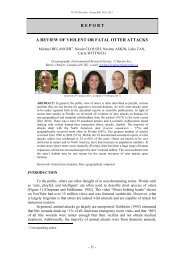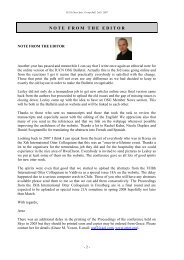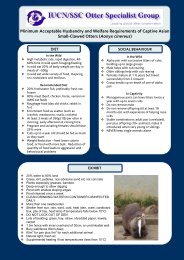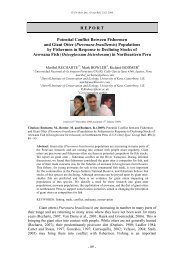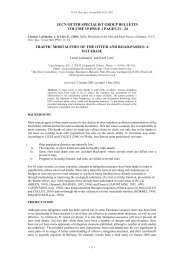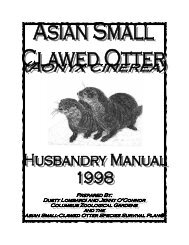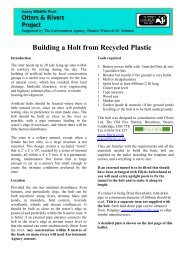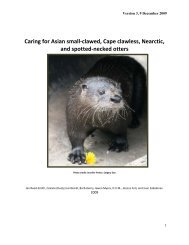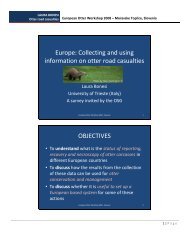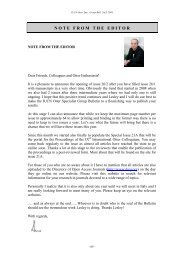International Giant Otter Studbook Husbandry and Management
International Giant Otter Studbook Husbandry and Management
International Giant Otter Studbook Husbandry and Management
Create successful ePaper yourself
Turn your PDF publications into a flip-book with our unique Google optimized e-Paper software.
should then be allowed to lick the formula drop by drop from the dropper/syringe tip. Caution:<br />
inappropriate feeding apparatuses (as well as techniques) can cause failure to nurse<br />
successfully or/<strong>and</strong> health hazards (see Section 9).<br />
Critical: cubs must be fed slowly <strong>and</strong> in small amounts <strong>and</strong> h<strong>and</strong>rearer’s should never<br />
overfill the cub’s mouth. If formula comes out of the mouth or nose, or gagging is heard<br />
or seen, feeding must be stopped immediately, <strong>and</strong> emergency care techniques may need to<br />
be used (See Section 9 to help prevent serious health problems.) The problem causing<br />
overfilling of the mouth must be corrected before resuming feeding. See Section 8 on not over<br />
feeding (i.e. round but not taught bellies). When bottles / feeding apparatuses become empty,<br />
cubs should not be allowed to nurse. Discomfort <strong>and</strong> hiccoughs can occur when cubs suck air<br />
into their stomachs. Clean towels should be placed underneath <strong>and</strong> even around the cub during<br />
feeding to help keep cubs warm <strong>and</strong> secure feeling, as well as clean. When young or sick cubs<br />
are removed from their incubator or holding container they should be placed on a hotwater<br />
bottle wrapped in a towel to keep them warm during feeding. Place towels lightly over the<br />
cub’s body to also help keep them warm. Formula must be cleaned off cubs (with a warm damp<br />
cloth) <strong>and</strong> cubs must also be dried after feeding. Because cubs usually want to sleep or maybe<br />
even play just after feeding, cleaning cub housing before feeding is helpful.<br />
Section 11<br />
Techniques to Administer Oral Medications / Nutritional Supplements<br />
Some liquids, tablets (that are crushed), or capsules (that are opened) for medication or<br />
nutritional supplement can be diluted with milk formulas for administration. (Veterinarian<br />
approval must first be given, as some medications may not be effective if they are administered<br />
this way.) If milk formulas are used the medication should be placed in a small amount of<br />
formula that can be fed first <strong>and</strong> before the remaining formula is fed. This is to ensure that the<br />
medications will be consumed. When dispensing apparatuses (i.e. plastic syringes, plastic eyedroppers,<br />
etc.) are used to administer medications that cubs most likely will refuse (i.e. it tastes<br />
bad), the cub’s mouth should be very gently opened <strong>and</strong> a small (i.e. drop or drops) amount of<br />
fluid/paste should be squeezed onto the top of the cub’ tongue. The feeding apparatus should<br />
then be immediately removed from the cub’s mouth <strong>and</strong> the cub’s mouth should be gently<br />
closed <strong>and</strong> held closed until the cub swallows. Stroking the cub under its throat or around its<br />
face or lips may help stimulate swallowing. With older bigger cubs, if tablets <strong>and</strong> capsules are<br />
small enough, they might be able to be administered as follows. After the cub’s mouth is gently<br />
opened, the caretakers fingers can be used to place the medication at the back of the cub’s<br />
mouth <strong>and</strong> on top of its tongue. The cub’s mouth should then be gently closed <strong>and</strong> held closed<br />
until the cub swallows. Medications, vitamin <strong>and</strong> mineral supplements (e.g. crushed / whole<br />
tablets, liquids, paste) can also be hidden in / mixed with foods (e.g. formulas, yogurt, fish, etc.)<br />
to disguise their taste <strong>and</strong> presence for easier administration. Great caution must be taken to<br />
prevent choking <strong>and</strong> aspiration when giving medications orally (i.e. the same cautions used<br />
when feeding).<br />
245



